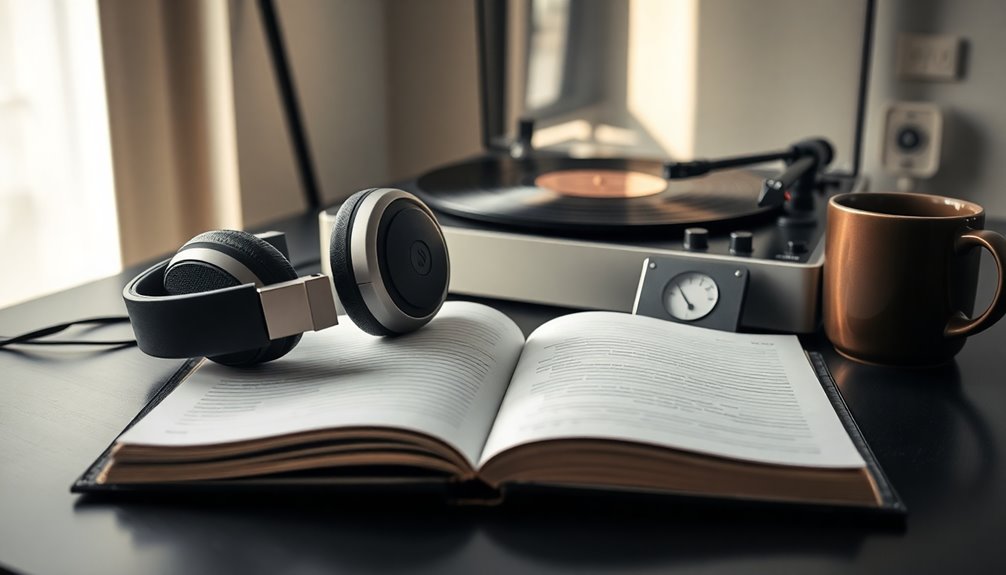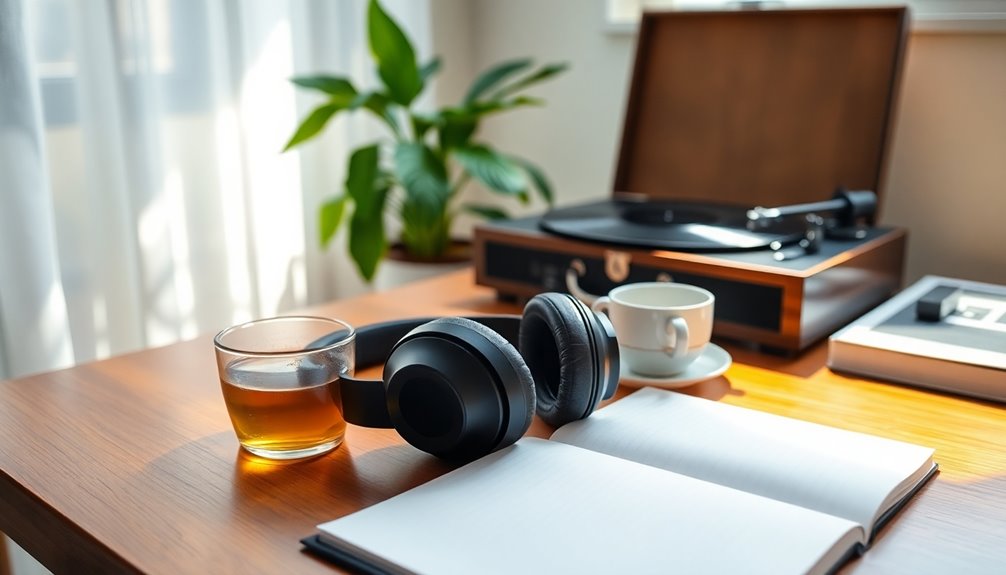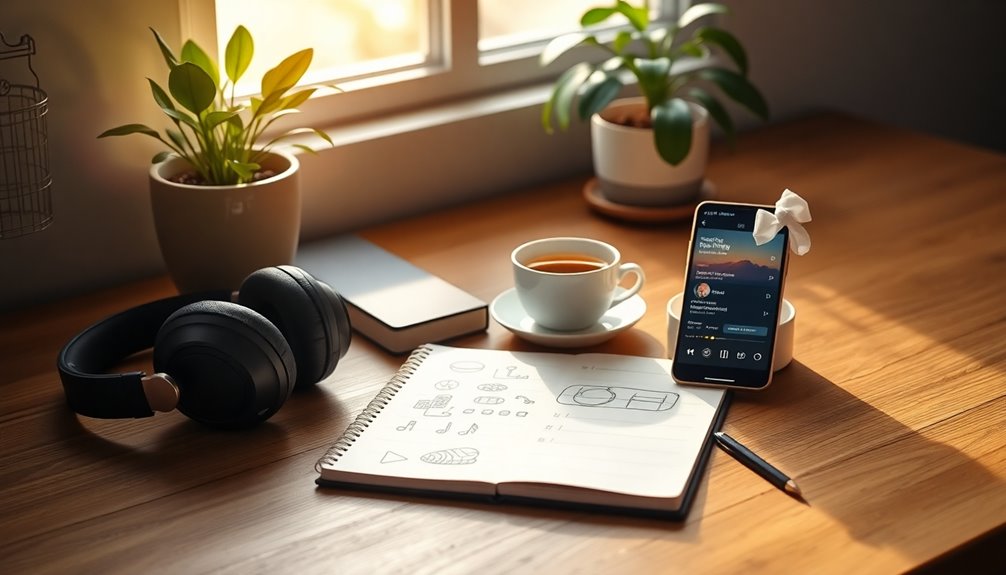You can boost your focus with music in several effective ways. Start by choosing calming flute melodies or ambient sounds to create a soothing environment. Curate specific playlists for different tasks and set the volume to moderate levels, ideally around 60-70%. Experiment with various genres, like classical or lo-fi beats, to find what resonates best with you. Establish a dedicated work routine and limit distractions during your listening periods. Reflect on your productivity regularly, adjusting your music choices as needed. Stick around to uncover even more strategies that can elevate your concentration and make your work sessions more enjoyable!
Key Takeaways
- Create a dedicated, clutter-free listening environment to minimize distractions and enhance focus during work sessions.
- Curate playlists with calming flute melodies, ambient sounds, and classical music to promote concentration and reduce anxiety levels.
- Maintain moderate volume levels (60-70% of max) to ensure music supports focus without overwhelming your thoughts.
- Experiment with different music styles, including lo-fi and nature soundscapes, to find the ideal soundtrack for your productivity.
- Establish a routine by allocating specific time blocks for focused work and adjusting your playlists to match different tasks.
Choose Calming Flute Melodies

When you're trying to boost your focus, choosing calming flute melodies can make a significant difference. The gentle tones of the flute create an atmosphere that promotes relaxation and concentration. Studies show that listening to music, especially soothing instrumental pieces, can enhance cognitive performance by reducing stress and anxiety.
When you immerse yourself in these calming effects, you'll find it easier to stay engaged and productive. Imagine sitting down to work, and as you press play on your favorite flute tracks, a wave of tranquility washes over you. The soft, airy notes draw you in, allowing your mind to settle.
This isn't just wishful thinking; it's a scientific fact. The flute's soothing quality can lower your heart rate and encourage a state of mindfulness. You might feel a sense of belonging with the music, as if the melodies understand your need for calm and focus. Additionally, the concert flute, with its bright and versatile sound, is especially effective at creating a peaceful atmosphere for concentration.
Engaging with the flute benefits not only your mental clarity but also your emotional well-being. When you allow these calming melodies to be your background, you're inviting a peaceful presence into your workspace, creating a safe haven for creativity and productivity.
Create a Dedicated Playlist

Creating a dedicated playlist can amplify the calming effects of flute melodies and help you stay focused throughout your work session. When you take the time to curate your playlist, you're not just selecting songs; you're crafting an environment that supports your concentration and creativity. Think of it as your personal sanctuary, where each note resonates with your desire for belonging and productivity.
Start with playlist organization. Group your flute melodies with other instrumental tracks that evoke similar feelings. This way, you create a seamless flow of sound that won't disrupt your focus. You might consider adding tracks from genres like classical, ambient, or even soft electronic music. By carefully mixing these tunes, you allow your mind to drift into a state of flow, where distractions fade away.
Next, focus on genre selection. If you find that certain styles resonate more with you, lean into them. Whether it's the gentle sway of classical or the soothing layers of ambient soundscapes, align your choices with what calms your mind and inspires focus. Remember, your playlist is a reflection of your unique preferences and needs, so don't hesitate to personalize it. Incorporating pieces from celebrated composers like Bach and Vivaldi can enhance your playlist's emotional depth and musical variety.
Finally, don't be afraid to experiment. What works one day mightn't feel right the next. Listen to your instincts and adjust your playlist as needed. By creating a dedicated playlist, you're building a supportive tool that nurtures your focus and enhances your work sessions.
Set the Right Volume

To enhance your focus effectively, it's vital to find the right volume for your music. The balance of sound can greatly impact your ability to concentrate, so let's talk about volume control.
If your music's too loud, it can overwhelm your thoughts, making it hard to stay on task. On the other hand, if it's too soft, it might fade into the background, losing its motivational power.
Research suggests that a moderate volume often strikes the perfect balance, creating a sound environment that encourages productivity. Aim for a level where you can hear the music clearly, but it doesn't drown out your thoughts.
A good rule of thumb is to keep it at about 60-70% of your device's maximum volume. This way, you can enjoy the rhythm and melody without being distracted by the noise. Regular maintenance of your instruments, such as using a flute cleaning kit, can also contribute to better sound quality, enhancing your overall listening experience.
Remember, everyone's ideal volume might differ, so it's worth paying attention to how various levels affect your focus. If you notice your mind wandering, it might be time to adjust the volume.
You're not alone in this journey; many others are experimenting with their volume settings to discover what works best for them.
Experiment With Different Styles

Discovering the right music style can be a game-changer for your focus and productivity. It's all about finding what resonates with you personally. Music impacts our brainwaves and emotions, so experimenting with different styles can help release your creative potential.
Whether you lean toward classical vs. contemporary tunes, exploring various instrumental genres can lead you to your perfect study soundtrack. Here are three styles to reflect on:
- Classical Music: Often hailed for its intricate compositions, classical music can enhance cognitive function. Pieces by composers like Bach or Mozart may help improve concentration by creating a calming atmosphere.
- Ambient Music: This contemporary genre focuses on tone and atmosphere over traditional musical structure. Ambient tracks offer a serene background, making them perfect for tasks that require deep focus without distraction.
- Lo-fi Beats: A modern favorite, lo-fi music blends smooth jazz and hip-hop elements. Its laid-back vibe can provide a comforting backdrop, making it easier to immerse yourself in your work.
Additionally, the way music is articulated through dynamics can influence your focus and emotional engagement. Don't hesitate to mix and match these styles! You might discover that a combination of classical melodies and contemporary beats works wonders for your concentration.
Use Flute Music for Background

Flute music can serve as an enchanting backdrop for your study sessions or creative tasks. Its gentle melodies create a serene atmosphere, helping you tap into your focus techniques. You might find that the airy sound of the flute lifts your spirits and encourages a sense of belonging, making your workspace feel more inviting.
Research shows that instrumental music, particularly flute music, can enhance concentration and reduce anxiety. The flute benefits include its ability to resonate at frequencies that promote a calming effect on the mind. When you're immersed in your work, these soothing sounds can help block out distractions, allowing your thoughts to flow freely and your creativity to flourish.
To make the most of this experience, try curating a playlist of flute compositions that resonate with you. Consider pieces that have a steady tempo and minimal dramatic shifts in volume. This way, you can maintain a consistent focus without the jarring interruptions of sudden changes.
Experiment with different genres, too—classical, contemporary, or even world music featuring the flute. You'll likely discover what best aligns with your personal rhythm and style. The emotional depth of flute music can enhance storytelling, enabling complex narratives and feelings, which may further inspire your creative tasks.
As you settle into your tasks, let the flute music wash over you, creating an atmosphere that feels both comforting and stimulating. You'll find that with each note, you're not just listening; you're inviting a sense of clarity and purpose into your creative space.
Embrace the magic of the flute, and watch your focus soar.
Incorporate Nature Sounds

As you explore ways to enhance your focus, incorporating nature sounds can create a harmonious environment that complements the soothing effects of flute music.
Nature soundscapes, filled with the gentle rustle of leaves, flowing water, or bird calls, can help ground you, promoting a sense of calm and clarity. These ambient recordings not only provide a pleasant auditory backdrop but also have been shown to reduce stress and improve concentration. Additionally, the use of proper embouchure in flute playing can enhance overall sound quality, making the music even more soothing.
Here are three ways to effectively incorporate nature sounds into your focus routine:
- Choose Your Soundscapes Wisely: Experiment with different nature soundscapes. You might find that the sound of rain helps you focus better than chirping birds. Pay attention to what resonates with you.
- Create a Dedicated Listening Space: Set up a comfortable area where you can enjoy these ambient recordings. This space should be free from distractions, allowing you to immerse yourself in the soothing sounds of nature.
- Use Technology to Your Advantage: There are numerous apps and websites that offer high-quality nature sounds. Some even allow you to mix different elements, creating a personalized soundscape that perfectly suits your needs.
Limit Distractions While Listening

When you're trying to focus, it's essential to limit distractions that could disrupt your concentration. We all know how frustrating it can be when background noise pulls you away from your tasks. To create a focused environment, consider using noise cancellation headphones. These can greatly reduce ambient sounds, allowing you to immerse yourself in your music and the work at hand.
You might also want to establish a dedicated space for your focused sessions. Whether it's a cozy nook in your home or a quiet corner in a café, having a specific spot signals your brain that it's time to engage with your work. Make sure this space is free from clutter and distractions—your surroundings can greatly influence your ability to concentrate.
Additionally, consider silencing your phone or any other devices that might ping or buzz. Let's face it, those notifications can be tempting! Setting your status to "Do Not Disturb" can help you maintain that focused environment where you can really delve into what you need to accomplish.
Lastly, be mindful of the type of music you choose. Instrumental or ambient tracks can help maintain your focus without competing for your attention. Incorporating metronome practice into your routine can also enhance your concentration and timing while playing an instrument.
Establish a Routine

Creating a focused environment is just the beginning; establishing a routine can greatly enhance your ability to concentrate. By incorporating focus techniques into your daily habits, you'll not only improve your productivity but also foster a sense of belonging in your work or study space.
Routines can provide structure and create an environment where you feel more at ease, allowing your mind to dive deeper into your tasks.
Here are three simple steps to help you establish a routine that boosts your focus:
- Set Specific Time Blocks: Designate certain times of the day for focused work. Consistency helps train your brain to know when it's time to concentrate.
- Incorporate Music Wisely: Choose specific playlists or types of music for different tasks. Whether you need something calming or energizing, pairing music with your routine can enhance your concentration. You might also consider using flute tuners to ensure your music is perfectly pitched, which can further support your focus.
- Reflect and Adjust: At the end of each week, take a moment to review your routine. What worked? What didn't? Making small adjustments can lead to significant improvements in your focus.
Pair Music With Tasks

Music can be a powerful ally in your quest for focus, and pairing it effectively with specific tasks can make all the difference. When you associate different music genres with particular tasks, you create a mental anchor that can boost your productivity. This simple strategy can help you feel more engaged and connected to your work.
Here's a little table to guide your task association:
| Task Type | Recommended Music Genres |
|---|---|
| Deep Work | Classical, Ambient |
| Creative Projects | Jazz, Indie, World Music |
| Routine Tasks | Upbeat Pop, Electronic |
| Study Sessions | Lo-fi, Instrumental |
Try to match the energy of the music to the energy required for the task. For instance, if you're diving into deep work, classical or ambient music can provide a calming backdrop, allowing you to concentrate without distraction. On the other hand, if you're working on something creative, jazz or indie tunes can inspire innovative thoughts. Additionally, consider incorporating structured progression in your music choices for an enhanced focus experience.
Reflect on Your Productivity

Reflecting on your productivity can be a game-changer in how you approach your work.
It's not just about getting tasks done; it's about understanding what truly drives your effectiveness. By practicing mindful reflection, you can create a clearer picture of your work habits, allowing you to make meaningful adjustments.
Here are three steps to guide your productivity assessment:
- Identify Patterns: Take a moment to think about when you feel most productive. Is it early morning or late at night? Recognizing these patterns can help you align your tasks with your peak performance times.
- Evaluate Your Environment: Consider where you work best. Is it a quiet space, or do you thrive with background music? Your environment plays an essential role in your focus and can greatly impact your productivity.
- Review Your Music Choices: Reflect on how different types of music have influenced your workflow. Do certain playlists help you concentrate better? Understanding this can lead to more intentional music selections that boost your productivity. Additionally, exploring mindful breathing techniques before starting work can help center your focus and enhance your efficiency.
Frequently Asked Questions
Can Music Help Improve Memory Retention While Studying?
Absolutely, music can enhance your memory retention while studying.
When you combine music with effective memory techniques, you create a more engaging study environment. Upbeat or instrumental tracks can energize your brain, making it easier to absorb information.
It's all about finding the right vibe that resonates with you. So, experiment with different genres to see what helps you focus and remember better.
You'll feel more connected and productive in your learning journey!
What Genres of Music Are Best for Enhancing Focus?
When you're trying to enhance your focus, consider diving into genres like instrumental beats and ambient sounds.
These styles create a soothing backdrop, allowing your thoughts to flow without distraction. Instrumental tracks, often free from lyrics, can help maintain your concentration, while ambient sounds can transport you to a calming space.
How Long Should I Listen to Music for Maximum Productivity?
Did you know that listening to music for about 30 to 60 minutes can greatly boost your productivity levels?
You'll find that this music duration creates a perfect balance between focus and distraction. Too little time may not engage you enough, while too much could lead to fatigue.
Experiment within this timeframe to discover what works best for you. You're not alone in this journey; many others thrive on music's motivating power!
Are There Specific Times of Day When Music Is Most Effective?
You might find that music's effectiveness varies throughout your day. In the morning, upbeat tunes can spark motivation, helping you tackle tasks with energy.
As the day winds down, consider softer melodies for evening relaxation, easing your change into a calm state. Listening during these specific times can enhance your productivity and well-being, fostering a sense of belonging and connection with your environment.
Trust your instincts; let music guide you through your daily rhythm.
Can I Use Music to Help With Anxiety or Stress Management?
Absolutely, you can use music to help manage anxiety and stress. Music therapy has shown significant benefits, promoting relaxation and emotional well-being.
Creating calming playlists filled with soothing melodies can provide a comforting backdrop during challenging times. As you listen, let the rhythms guide your breath and thoughts, fostering a sense of belonging and peace.
Conclusion
In a world filled with distractions, music can be your ally. By embracing calming flute melodies, you create a sanctuary for your mind. While it's easy to lose focus, establishing a routine and pairing music with tasks helps you regain clarity. Reflecting on your productivity reveals how these small changes can lead to big results. So, turn up the volume on your focus, and let the soothing sounds guide you through your day with intention and purpose.






